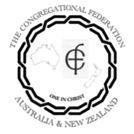LOREM IPSUM DOLOR
LOREM IPSUM DOLOR
LOREM IPSUM DOLOR
LOREM IPSUM DOLOR

Congregationalism: "A system of ecclesiastical polity that leaves legislative, dsciplinary and judicial functions to the individual Church".
It is derived from the Latin word 'congregat' meaning 'collected into a flock/united'. Derivatives then are; 'congregate', congregatIon','Congregational' and 'Congregtionalist'. (Oxford English Dictionary).
As part of the universal company of the Lord's Free People we, the Churches of the Congregational Federation of Australia and New Zealand, share with many the concept of the 'gathered' Church in which persons living in a locality annd responsive to the Lordship of Jesus Christ voluntarily unite themselves into a congregation for the purpose of worship, fellowship and service. God has given the local Church every power necessary for its spiritual functioning. It does not need the authority of a Pope or a General Council or any body external to itself in order to do the Lord's work. The essential nature of Congregationalism is Biblical: its polity is built on the firm foundation of Scripture. The great central text of Congregationalism is Matthew 18 : 18 - 20, in which Christ says to the people of the early Church: "Verily I say unto you . . . where two or three are gathered together in my name, there I am in the midst of them."
From that passage we draw two principles: (1) the Headship of Christ and (2) the completeness of each gathered Church. 'Headship' means that Christ is the Head of each local Church. It is commonly, but erroneously believed that Congregational Churches are democratic or majority-ruled in their government. The true Congregational Church is a theocracy: it is ruled and guided by God.
Autonomy, self-government under God, is the distinct witness of Churches of the Congregational Order. The local Church is free from the bondage of ecclesiastical control. Thesecond great truth of Congregationalism is the fellowship of the Churches. In the New Testament we find Churches associated with onecanother as equals, with neither one Church claiming authority over the others, nor the several Churches lording it over the one.
The early Churches lived together in an atmosphere of mutual love, not in a relationship of dominance and submission. Congregationalists, following their example, have companied together because they wanted to, not because a Bishop or a Book of Discipline forced them to. Fellowship is neither organisational, legal or political in essence; it is a free relation of affection.
Yet, because we are not ourselves alone but the "Lord's Free People", we recognise that we are partv of a larger fellowship that extends around the globe wherever others respond as we do to thec redeeming love of our Lord. We believe that therre is need for us to reach out to one another in mutuality and affection, that together we witness that the Congregational Way not be lost inthe world-wide structures councils and structures of Christendom and that we share on equal grounds with our fellow Christians who are organised according to Episcopal or Presbyterian policies.
Though we extol and defend thewholeness and completeness of each gathered local Church as our distinctive and cherished witness, we do not narrowly deny the validity of other Church Orders, nor esteem them to be ways of darkness. "The lamps are many; the Light is One".
Enter Text
